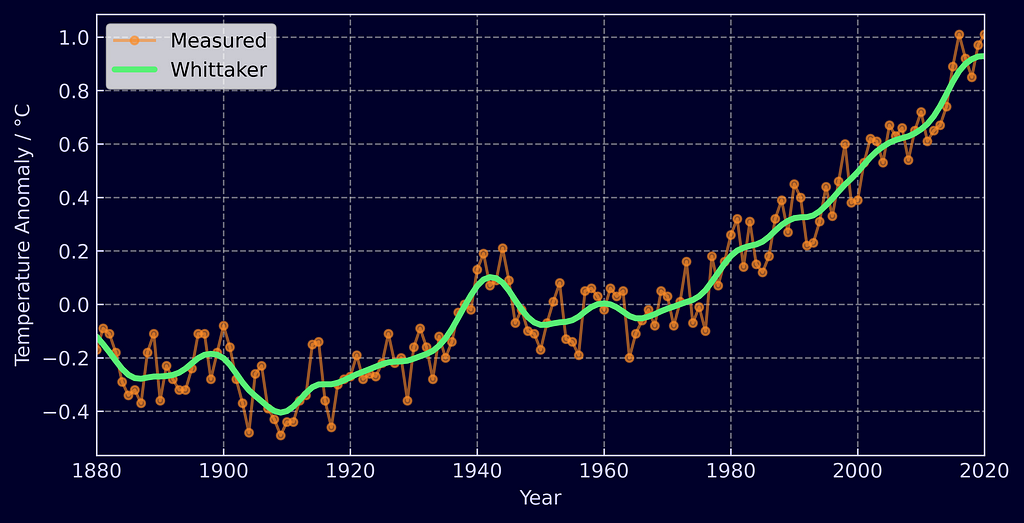The Whittaker-Eilers method offers fast and reliable smoothing and interpolation for noisy real-world data, providing a solution for cleaning and analyzing data. With the ability to effectively handle gaps and unevenly spaced measurements, it outperforms other methods in terms of speed and adaptability while achieving balanced smoothness and minimal residuals.

“`html
Insanely fast and reliable smoothing and interpolation with the Whittaker-Eilers method
Real-world data is never clean. Whether you’re carrying out a survey, measuring rainfall or receiving GPS signals from space, noisy data is ever present. Dealing with such data is the main part of a data scientist’s job. It’s not all glamorous machine learning models and AI — it’s cleaning data in an attempt to extract as much meaningful information as possible. If you’re currently looking at a graph that has way too many squiggles to be useful, the Whittaker-Eilers method provides the solution you’re looking for.
Whittaker-Eilers Smoothing
The Whittaker-Eilers smoother was introduced to handle noisy, gappy time-series data that needs to be smoothed and interpolated. It offers a straightforward way to make the trend stand out and can be implemented with just a few lines of code in Python or Rust.
Smoothing
Smoothing the data using the Whittaker-Eilers method offers a simple way to make the trend stand out, and it only takes a few lines of code to run. It can be implemented in Python or Rust, making it accessible for a wide range of users.
Interpolation
The Whittaker-Eilers method effortlessly handles gaps in data and can be used to accordingly weight measurements based on their uncertainty. It can also handle unevenly spaced measurements, making it a versatile solution for data interpolation.
Configuration
With a single parameter, λ (lambda), users have continuous control over the smoothness of the data. The order of the smoother, d, is also controllable, allowing for customization based on specific requirements.
Comparison with other methods
The Whittaker-Eilers method outperforms other techniques such as Gaussian kernel smoothing, Savitzky-Golay filter, and Local Regression (LOWESS) in terms of speed and efficiency, making it a practical choice for middle managers looking to streamline data processing.
Benchmarking
The Whittaker-Eilers method stands out as the quickest solution for smoothing time-series data, offering fast and efficient performance even with longer time-series.
The Mathematics
The Whittaker-Eilers method is based on a robust mathematical framework, ensuring its reliability and effectiveness in handling noisy and gappy data.
Interpolation
The Whittaker-Eilers method’s ability to handle interpolation is a key feature, setting it apart from other techniques and providing added value for users.
Filter Order
The order of the Whittaker-Eilers smoother provides users with additional flexibility and control, allowing for customization based on specific data processing needs.
Sparse Matrices
The use of sparse matrices enhances the efficiency and performance of the Whittaker-Eilers method, making it a practical and resource-efficient solution for handling large datasets.
Spotlight on a Practical AI Solution
Discover how AI can redefine your company’s way of work and stay competitive. Identify Automation Opportunities, Define KPIs, Select an AI Solution, and Implement Gradually. For AI KPI management advice, connect with us at hello@itinai.com. For continuous insights into leveraging AI, stay tuned on our Telegram channel or Twitter.
Spotlight on a Practical AI Solution: AI Sales Bot
Consider the AI Sales Bot designed to automate customer engagement 24/7 and manage interactions across all customer journey stages. Explore solutions at itinai.com/aisalesbot.
“`
List of Useful Links:
- AI Lab in Telegram @aiscrumbot – free consultation
- The Perfect Way to Smooth Your Noisy Data
- Towards Data Science – Medium
- Twitter – @itinaicom
























